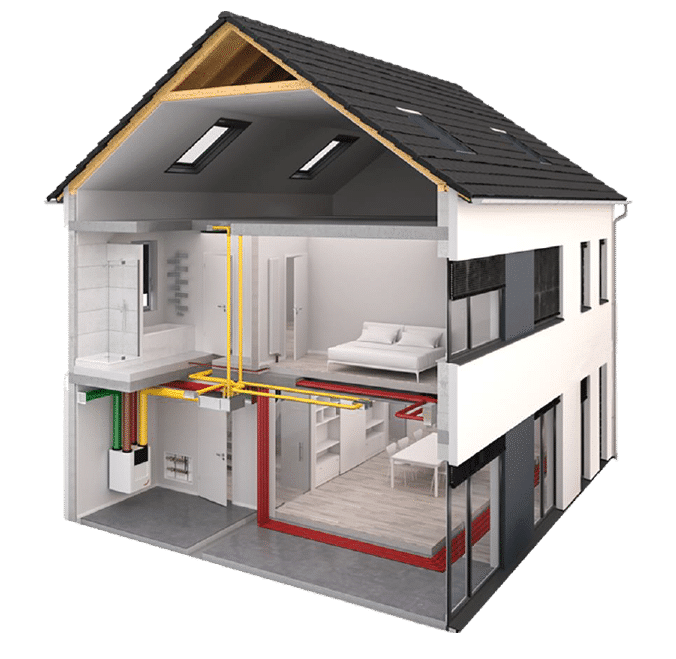How Long Does HRV Last? Understanding System Lifespan
Wiki Article
Exploring the Perks of Heat Recovery Ventilation for Energy Performance in Houses
Heat Recovery Ventilation (HRV) systems use home owners a sensible technique to improving energy efficiency. By redeeming warmth from outward bound air, these systems can significantly decrease heating and air conditioning prices. Furthermore, they give a constant supply of fresh air, improving indoor air top quality and comfort degrees. As home owners consider lasting options, understanding the subtleties of HRV systems becomes significantly vital. What elements should one assess before making such a financial investment?Recognizing Heat Recovery Ventilation Equipments

Just How HRV Improves Indoor Air Quality

Power Cost Savings: The Economic Benefits of HRV
Taking full advantage of energy effectiveness, heat recovery ventilation (HRV) systems provide significant economic advantages for property owners. By recuperating and reusing heat from exhaust air, HRVs significantly minimize cooling and heating costs. This modern technology can result in energy financial savings of approximately 30%, depending upon environment and use patterns. Property owners frequently observe minimized energy bills shortly after setup, making HRVs a monetarily wise investment gradually. Furthermore, lots of regions offer motivations or discounts for energy-efficient upgrades, additionally improving the financial charm. As energy prices proceed to rise, the cost-effectiveness of HRVs becomes significantly clear. In general, the unification of HRV systems not only promotes power performance but also adds to long-lasting economic cost savings for homes.The Ecological Influence of Heat Recovery Ventilation
A significant environmental advantage of heat recovery ventilation (HRV) systems lies in their ability to minimize total energy consumption. By recovering warm from exhaust air and moving it to inbound fresh air, HRV systems lessen the requirement for energy-intensive home heating and cooling down techniques. This reduction in energy demand adds to reduce greenhouse gas exhausts, as much less fossil fuel is needed to preserve comfy interior temperatures. Additionally, HRV systems enhance indoor air high quality by effectively trading stagnant air with fresh exterior air, lowering reliance on mechanical air conditioning systems that can hurt the setting. In general, the implementation of HRV systems supports lasting living techniques and aligns with global efforts to deal with climate modification by advertising power performance in property setups.
Selecting the Right HRV System for Your Home
Just how can property owners guarantee they select the right heat recovery ventilation (HRV) system for their needs? Initially, they ought to examine their home's size and format, as these aspects influence air movement demands. Next off, reviewing the system's effectiveness scores is vital, as higher rankings suggest better performance and power savings. Homeowners should additionally take into consideration installment and upkeep expenses, comparing different brands and models for worth. Additionally, it's essential to evaluate sound degrees, as some systems operate more quietly than others. Consulting with cooling and heating experts can provide customized suggestions based upon details home problems. Examining user reviews and warranties can assist in making a notified choice, ensuring that the chosen HRV system properly boosts interior air high quality and energy effectiveness.Frequently Asked Concerns

Exactly how Frequently Should I Clean or Maintain My HRV System?
The regularity of cleaning or keeping a warm recuperation ventilation (HRV) system generally relies on use and ecological factors. Usually, it is suggested to perform maintenance every six months to assure peak efficiency and air high quality.
Can HRV Solutions Assist Reduce Moisture Levels Indoors?
HRV systems can efficiently minimize interior moisture levels by exchanging stagnant, damp air with fresh, drier air from outside. HRV Heat Recovery Ventilation. This process aids maintain a balanced interior environment, enhancing comfort and preventing moisture-related concerns
What Is the Lifespan of a Regular HRV System?
The life-span of a regular heat recovery ventilation (HRV) system differs, generally lasting between 10 to 15 years. Regular maintenance can extend its effectiveness and operational life, making sure peak performance throughout its usage period.Exist Any Noise Worry About HRV Equipments?
Noise worry about HRV systems can arise, specifically from fan operation. Numerous modern-day units are created to lessen audio levels, ensuring they operate silently while maintaining effectiveness, which attends to prospective disturbances in living atmospheres.Can I Set Up an HRV System Myself, or Do I Need a Professional?
The private contemplated whether to install the heat recovery ventilation (HRV) system directly or work with a professional. HRV Heat Recovery Ventilation Usually, while do it yourself setup is possible, competence guarantees appropriate performance and conformity with neighborhood building codes, improving system performance.Report this wiki page